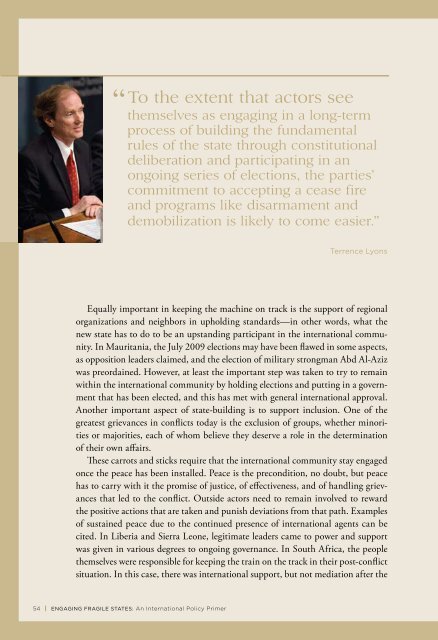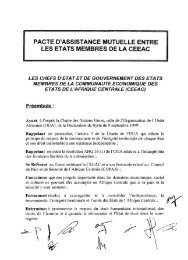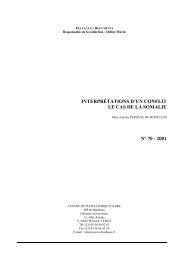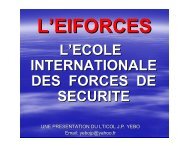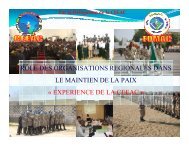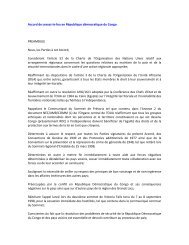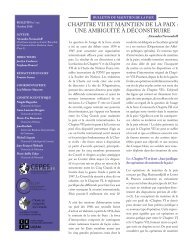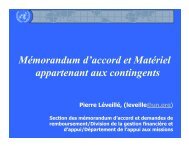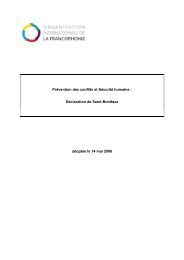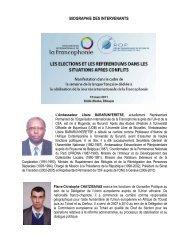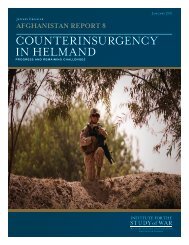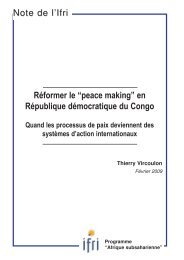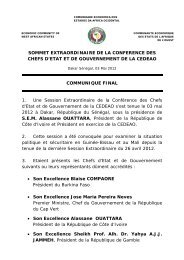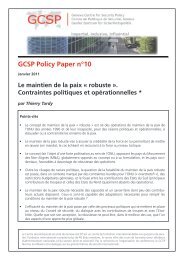engaging fragile states - Woodrow Wilson International Center for ...
engaging fragile states - Woodrow Wilson International Center for ...
engaging fragile states - Woodrow Wilson International Center for ...
You also want an ePaper? Increase the reach of your titles
YUMPU automatically turns print PDFs into web optimized ePapers that Google loves.
“<br />
To the extent that actors see<br />
themselves as <strong>engaging</strong> in a long-term<br />
process of building the fundamental<br />
rules of the state through constitutional<br />
deliberation and participating in an<br />
ongoing series of elections, the parties’<br />
commitment to accepting a cease fire<br />
and programs like disarmament and<br />
demobilization is likely to come easier.”<br />
Terrence Lyons<br />
Equally important in keeping the machine on track is the support of regional<br />
organizations and neighbors in upholding standards—in other words, what the<br />
new state has to do to be an upstanding participant in the international community.<br />
In Mauritania, the July 2009 elections may have been flawed in some aspects,<br />
as opposition leaders claimed, and the election of military strongman Abd Al-Aziz<br />
was preordained. However, at least the important step was taken to try to remain<br />
within the international community by holding elections and putting in a government<br />
that has been elected, and this has met with general international approval.<br />
Another important aspect of state-building is to support inclusion. One of the<br />
greatest grievances in conflicts today is the exclusion of groups, whether minorities<br />
or majorities, each of whom believe they deserve a role in the determination<br />
of their own affairs.<br />
These carrots and sticks require that the international community stay engaged<br />
once the peace has been installed. Peace is the precondition, no doubt, but peace<br />
has to carry with it the promise of justice, of effectiveness, and of handling grievances<br />
that led to the conflict. Outside actors need to remain involved to reward<br />
the positive actions that are taken and punish deviations from that path. Examples<br />
of sustained peace due to the continued presence of international agents can be<br />
cited. In Liberia and Sierra Leone, legitimate leaders came to power and support<br />
was given in various degrees to ongoing governance. In South Africa, the people<br />
themselves were responsible <strong>for</strong> keeping the train on the track in their post-conflict<br />
situation. In this case, there was international support, but not mediation after the<br />
54 | Engaging Fragile States: An <strong>International</strong> Policy Primer


